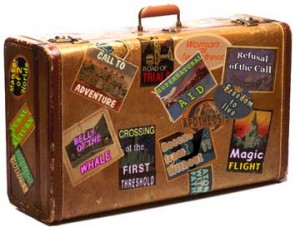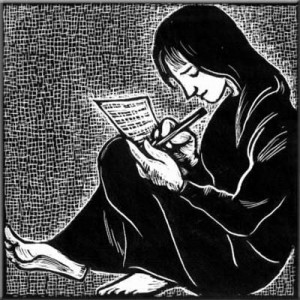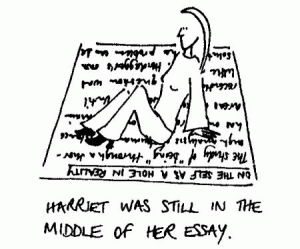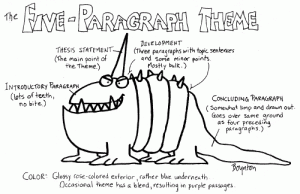Here’s the lowdown on Paper 2:
Section 1 DRAMA – 20 mins for unseen, 25mins for studied.
Unseen drama – there are two drama excerpts but you only need to answer on one.
The first is Shakespearean, and although the language is more difficult, the questions tend to be slightly easier. The second is modern drama.
There are usually three questions (15 marks each) and you need to answer two BUT NOT ALWAYS, sometimes they ask you to answer all three (10 marks each) so read the paper carefully. The type of questions that come up are:
- Describe a character or the relationship between two characters (see list of personality traits). Pick a character you like & explain why. Write a character sketch.
- What is the main theme/message in the extract?
- Describe the mood (dramatic/serious/tense/humorous…)
- Describe the setting.
- Imagine you are directing this scene – discuss two or more of the following: acting, blocking (movement on stage), body language/gestures, facial expressions, tone of voice, costume, props, set design & setting, sound effects, music, lighting.
- Write an ending for the scene / continue the scene / write a dialogue between two of the characters (including stage directions)
Studied drama – there are usually two questions and you answer whichever one you prefer. Sometimes you are asked to write an essay style answer for 30marks, sometimes they ask you to answer two related 15 mark questions. Try to write between one and a half and two pages but don’t go over the time allocated – 25 mins. The type of questions that come up ask you to write / write about
- A central character (a winner or a loser, lucky or unlucky, your favourite character, hero, heroine, villain)
- The relationship between two characters (they might specify – a tense/conflicted/loving/close/important relationship)
- Character profiles & an introduction to the play (focusing on the main theme) for the programme.
- Discuss the main theme/message of the play (2006 they specified one of these 4 themes: love/death/conflict/harmony) and show how this is relevant to your own life.
- Discuss the mood of the play (serious or lighthearted) and the impact this had on you.
- Describe the world of the play & discuss whether you would/would not like to live in this society.
- Would you recommend this play? (plot, setting, themes, characterisation, style of writing, opening & ending)
- A scene from the play – one filled with conflict or the most dramatic/memorable/tense/atmospheric/happy/sad/funny/tragic and discuss how this mood/feeling is created.
- Describe how you would produce a scene from the play you have studied.
- The opening scene or the final scene(s) – their impact on the audience & on you personally.
Section 2 Poetry – 20 mins for unseen, 25mins for studied
Unseen poetry – there are usually three questions (15 marks each) and you need to answer two BUT NOT ALWAYS, sometimes they ask you to answer all three (10 marks each) so read the paper carefully. The type of questions that come up are:
- Describe the speaker /poet / the poet’s relationship with a person, place, issue or event (see list of personality traits)
- Describe the mood in the poem / how is this mood created.
- Identify the theme (explain the central message of the poem in your own words)
- Discuss the style of writing (imagery /sound effects /structure /rhythm etc…) and explain why these features appeal to you.
- Do you like the poem (why/why not?)
- Discuss the title or choose a suitable title for this poem.
Studied poetry – there are usually two questions and you answer whichever one you prefer. Sometimes you are asked to write an essay style answer for 30marks, sometimes they ask you to answer two related 15 mark questions. Try to write between one and a half and two pages but don’t go over the time allocated – 25 mins.The type of questions that come up ask you to discuss a poem
- which deals with an important issue & the insights it gave you.
- which made you think.
- a love poem.
- which deals with either war or peace.
- which deals with youth or old age.
- setting / set in an interesting time or place.
- An unusual poem (unusual style/subject matter/experience).
- which celebrates a person, place or thing.
- with vivid imagery / which offers vivid images of a person.
- filled with imagination.
- which describes the poet’s wishes or thoughts.
- A poem with an interesting title.
- with interesting sound effects / musical qualities.
- Your favourite poem (for inclusion in an anthology).
- A poem with a special personal meaning for you.
- Compare two poems which deal with a similar theme.
- Compare the poem you liked best with the poem you liked least.
- Your favourite poet.
Section 3 – Fiction- 20 mins for unseen, 25mins for studied
Unseen fiction – there are usually three questions (15 marks each) and you need to answer two BUT NOT ALWAYS, sometimes they ask you to answer all three (10 marks each) so read the paper carefully. The type of questions that come up are:
- Describe a character / the relationship between two characters.
- Describe the mood and how it is created.
- Discuss the way the setting is described – does it bring the place to life for you?
- Discuss the style of writing – do you like the way the piece is written?
- Does this extract make you want to read on? Why/why not?
- Discuss the themes / relevance to a teenage audience.
- Write a dialogue based on the extract.
- Predict an ending for the extract.
In 2004 they indirectly asked a question about catharsis – tough question! It was phrased like this “We enjoy reading stories because they enable us to explore the outer edges of the unknown, strangeness, things that cannot be explained – without feeling any danger to ourselves”. Do you agree?
On the surface this seems like a really tough question so let me make it simpler for you. Have you ever wondered why you like horror movies? Or violent video games (even though you’re not a violent person in real life)? Or Eastenders (it’s so bloody miserable and depressing all the time)? Or books that make you cry (I’m not a fan of PS I Love You but most of my – female – students love it)?
Some people suggest that we like all of these things because they’re not real. We can experience scary things in a fantasy way without putting our ‘real’ self in danger -the fear/rage/depression/sadness leave us as soon as we switch our brains off from the movie/video game/telly/book.
This process of temporarily experiencing negative emotions and then ‘cleansing’ them is known as catharsis. We enjoy this process because it helps us to lose ourselves in someone else’s life for a while (if our own life sucks) or to appreciate how good we have it (if our own life is better than what we’ve just watched) when the movie/video game/telly/book ends.
Studied fiction – there are usually two questions and you answer whichever one you prefer. Sometimes you are asked to write an essay style answer for 30marks, sometimes they ask you to answer two related 15 mark questions. Try to write between one and a half and two pages but don’t go over the time allocated – 25 mins. The type of questions that come up are:
- Describe a central character (one you admire, one who experiences change, one who makes an impact on others)
- The relationship between two characters (they might specify – a conflicted/loving relationship)
- Describe the setting of your novel / short story and explain how it is important to the plot.
- Describe the mood or atmosphere of a novel or short story you have studied.
- Discuss an interesting theme / conflict between good and evil.
- Discuss a twist / surprise / unexpected development and how this added to your enjoyment of the book / short story.
- Discuss features of the writer’s style which you found interesting.
- Rate your novel out of 5 stars and justify your rating OR would you recommend this novel to your peers OR would you nominate it for an award (one year they gave prompts that you might like to discuss – plot, setting, themes, characterisation, style of writing, opening & ending).
- Choose your favourite section. Describe what happens and say why you enjoyed it/found it memorable.
- Discuss the opening or ending of a novel / short story you have studied & say whether or not it impressed you.
- Discuss the appropriateness of the title of the novel.








